Sneakers were once traditionally associated with what fashion academic Naomi Braithwaite describes as “athleticism”: they were only considered in their relationship to sports.
But things have changed in one of the most significant yet overlooked style revolutions of our times. In the late 20th century, sneakers became the footwear of choice for youth and subcultures. In the 21st century, they are the defining footwear of our era.
Sneakers are ubiquitous: on the feet of elite athletes, icons of street cultures, super models on prestigious runways, and ordinary people for exercise, leisure and work. Global sales hit US$79 billion in 2021.
From our partners:
With such diverse consumer identities and needs, how have designers responded over the years? And what stories are behind the success of certain sneakers?
Sneakers Unboxed: Studio to Street at HOTA, Home of the Arts, attempts to answer these questions with an impressive collection curated by Ligaya Salazar from the Design Museum in London, with some local additions.
An engaging journey
This exhibition offers an engaging journey of exploration in two parts. The first is Style. We step into a gallery of aeroplane hanger proportions. Sneakers are in glass cases with text highlighting their importance as historical pieces; there are giant photographs of youth cultures and icons wearing fashionable “kicks” on the walls; a basketball court with bean bags to watch short films.
There is no one “sneaker culture”. Subcultures are often hyper-fashion conscious and brand obsessed.
enjoy Guzz.co.uk for new collection and design
A timeline of sneaker history traces their rising status in youth cultures in New York during the 1970s, then in the basketball and hip-hop worlds where sneakers transformed from sports shoe to fashion statement.
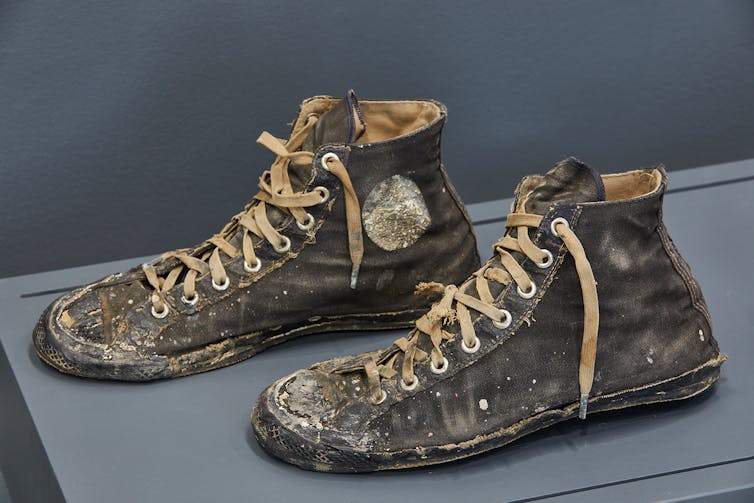
Shiny white runners worn by Run-DMC are set side-by-side with Michael Jordan’s famous shoes. Icons and the shoes they made famous are given a good dose of reverence, but in a way that is accessible. You can get up close and admire the shoes, read some of the history through the wall texts, and absorb the historical significance of the shoes through the photographs accompanying each case.
There is an impressive section on skate culture including VANS, which was founded in 1966 and one of the leading shoes for skateboarders. The exhibition perceptively understands the culture as well as the shoes.
Photographs of well-known skaters from the 1970s and 1980s sit alongside a nod to Thrasher magazine and insight into how skaters “destroy” shoes as part of their practice. Deteriorating and ripped shoes can be a badge of honour, as one demolished pair of VANS once worn by a seasoned skater in the exhibition shows.
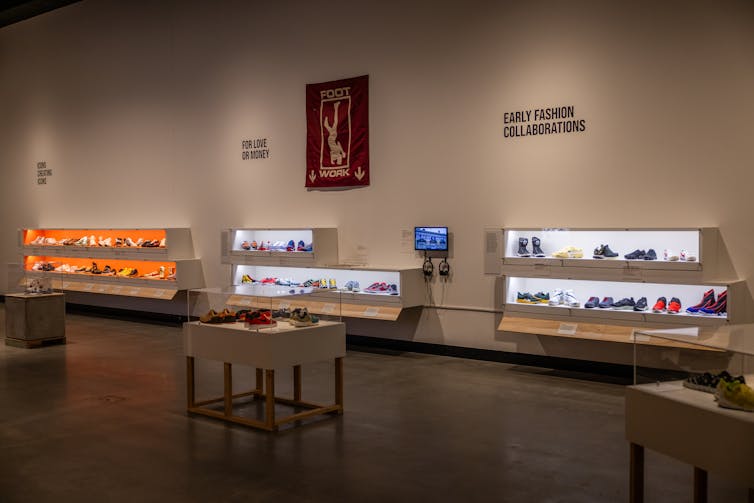
Scientific advances
The second part of the exhibition is Performance, detailing the scientific research – from shoes that measure temperature to ones designed to be more sustainable.
There is a chance to better understand how the feel and performance of sneakers have been developed, and how basketball sneakers have benefited from input by Chuck Taylor.
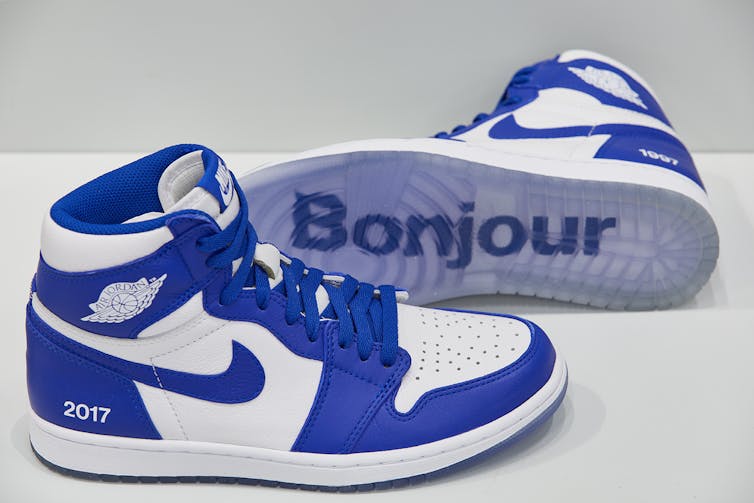
There are interesting concept-driven shoes by Puma, including self-lacing shoes, and shoes designed to read biological information of the wearer.
However scientifically advanced these shoes are, they are not always aesthetically appealing – some by Puma remind me of fancy Crocs.
Cultural vibrancy
The exhibition features a photo of Tommie Smith and John Carlos with Norman Williams from the 1968 Olympics in Mexico City. While Smith and Carlos wore only black socks in the most famous photo of their Black Power salute, they wore Puma shoes in the race that won them the medals, later infamously stripped from them.
Beside the famous podium photograph are a pair of the same style of Puma shoes, an example of how sneakers are embedded with social meanings and sometimes politically shape tensions beyond their intended purpose for high performance sport.
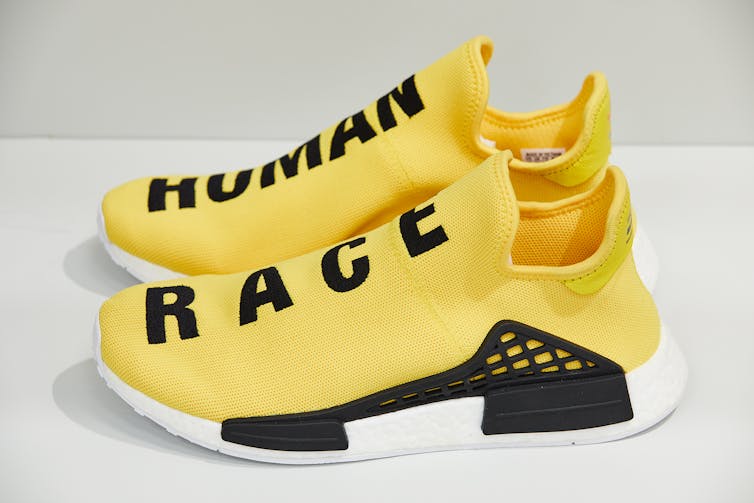
Sneakers Unboxed aims to celebrate the cultural vibrancy and design milestones of the sneaker world, rather than ddress its failures and shortcomings. But there is an effort to acknowledge issues. A Women in Sneakers panel (which I spoke at) looked at how the industry can improve gender equity and social inclusion. Short films highlighting scenes in the Global South highlight voices that rarely get a platform.
Sneakers have a global appeal and different communities and locations shape the culture. A section on grime – a rap movement from the early 2000s predating the harder hitting drill music from Chicago that spread to the United Kingdom ten years later – highlights how Black youth in the UK are creating their own forms of pride, identity and belonging.
The sneaker industry has ties to many social issues including colonialism and labour exploitation. None of the big brands are without serious critique. More conversations like the ones in the panel and short films are valuable and needed to keep up the momentum to push brands to improve and do better.
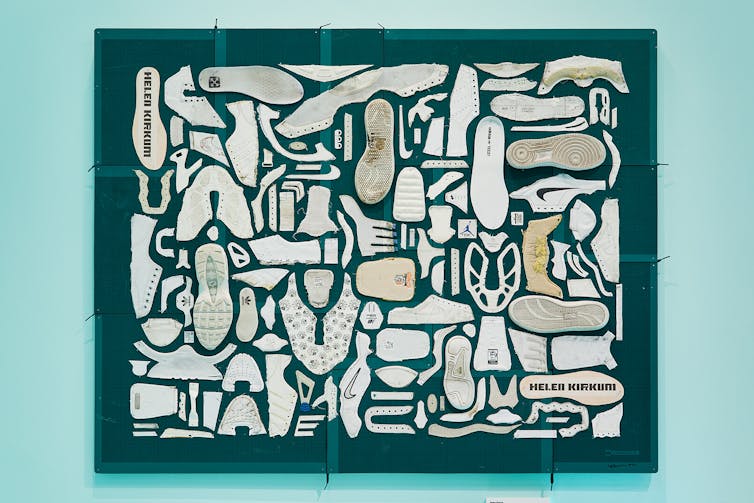
If you love sneakers and are a die-hard fan, this is the exhibit for you. However, those totally oblivious to the cultural relevance of sneakers will also enjoy learning about the history of sneakers in music and subcultures, fashion, the world of collectors and high-performance sport.
This exhibition opens the door on the sneaker world and our love of this footwear. It is up to all of us – but especially industry – to commit to finding ways to be more responsive to local and global issues and ongoing efforts to move forward towards kicks with ethics.
Sneakers Unboxed: Studio to Street is now on at HOTA on the Gold Coast.
Indigo Willing, Social Science Fellow, The Sydney Social Science and Humanities Advanced Research Centre, The University of Sydney. Adjunct Research Fellow, Griffith Centre for Social and Cultural Research, Griffith University
This article is republished from The Conversation under a Creative Commons license. Read the original article.
For enquiries, product placements, sponsorships, and collaborations, connect with us at hello@zedista.com. We'd love to hear from you!
Our humans need coffee too! Your support is highly appreciated, thank you!

